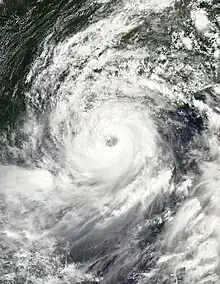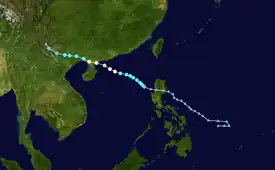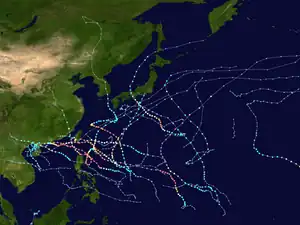Tropical Storm Talim (2023)
Severe Tropical Storm Talim, known in the Philippines as Tropical Storm Dodong, was a compact tropical cyclone that affected the Philippines, China, and Vietnam. The fourth named storm of the 2023 Pacific typhoon season, Talim originated from a weak monsoon depression east of Manila while moving towards Luzon. The system continued to track westward close to the northern edge of mainland Luzon before emerging off the coast of Ilocos Norte. A favorable environment allowed the fledgling tropical storm to rapidly intensify to a Category 2-equivalent typhoon on the Saffir–Simpson scale. The storm maintained this intensity until shortly before landfall near Zhanjiang, Guangdong on July 17. Talim quickly weakened and dissipated early on July 18.
 Severe Tropical Storm Talim at peak intensity on July 17 | |
| Meteorological history | |
|---|---|
| Formed | July 13, 2023 |
| Dissipated | July 18, 2023 |
| Severe tropical storm | |
| 10-minute sustained (JMA) | |
| Highest winds | 110 km/h (70 mph) |
| Lowest pressure | 970 hPa (mbar); 28.64 inHg |
| Category 2-equivalent typhoon | |
| 1-minute sustained (SSHWS/JTWC) | |
| Highest winds | 155 km/h (100 mph) |
| Lowest pressure | 973 hPa (mbar); 28.73 inHg |
| Overall effects | |
| Fatalities | 3 |
| Injuries | 9 |
| Damage | $5.78 million (2023 USD) |
| Areas affected | Philippines, China, Vietnam |
| IBTrACS | |
Part of the 2023 Pacific typhoon season | |
Talim brought heavy monsoonal rains over the Philippines and brought heavy rainfall and gusty conditions over the country as it neared Luzon. Rainfall from the storm helped raise the water level significantly in Angat Dam, the main water source for areas in Metro Manila but only slightly in more northern Magat Dam in Isabela. In China, authorities in Guangdong Province ordered the evacuation of at least 1,000 residents in Yunfu. In Vietnam, authorities announced on July 17, that the countries were preparing to evacuate approximately 30,000 individuals from high-risk locations in Quang Ninh, Thái Bình, and Haiphong. Overall, the storm was responsible for three deaths, nine injuries and US$5.78 million in damage across several countries.
Meteorological history

Tropical storm (39–73 mph, 63–118 km/h)
Category 1 (74–95 mph, 119–153 km/h)
Category 2 (96–110 mph, 154–177 km/h)
Category 3 (111–129 mph, 178–208 km/h)
Category 4 (130–156 mph, 209–251 km/h)
Category 5 (≥157 mph, ≥252 km/h)
Unknown
On July 12, the Joint Typhoon Warning Center (JTWC) began tracking a weak monsoon depression 298 nautical miles (552 km; 343 mi) east of Manila, slowly moving towards northern Luzon.[1] By the next day, the Japan Meteorological Agency (JMA) took note of same system, which was just off the coast of Aurora, Philippines.[2] A few hours later at 12:00 UTC, the JMA recognized the formation of a tropical depression.[3] Shortly after, the Philippine Atmospheric, Geophysical, and Astronomical Services Administration (PAGASA) issued a similar announcement, and subsequently named the system Dodong.[4] The system made landfall in Dinapigue, Isabela a few hours later.[5] The system continued to track westward close to the northern edge of mainland Luzon, crossing through Cagayan and Ilocos Norte.[6] It emerged off the coast of Ilocos Norte on July 14 at 09:00 UTC (17:00 PHT).[7]
Around 15:00 UTC, the JTWC began issuing advisories for the tropical depression and designated the system as 04W. Now back in warm seas and moving further westward away from land, the system found itself in a favorable environment and began consolidating further.[8] The system intensified into a tropical storm just prior to exiting the PAR and was subsequently named Talim by the JMA.[9][10][11] Talim left the Philippine Area of Responsibility while it maintained its strength which was announced by the PAGASA in its final bulletin on July 15.[12] The storm had a broad LLCC with deep convection persisting along the western and southern periphery.[13]
Talim continued to intensify in the South China Sea, later being upgraded into a severe tropical storm.[14] Talim moved west-northwestward within a favorable environment was being offset by equatorward outflow.[15] Talim continued to improved its convective banding with satellite imagery revealed a 30 nautical miles (56 km; 35 mi) ragged eye.[16] The JTWC's assessed the storm to have strengthened into 155 km/h (100 mph), equivalent to Category 2-equivalent typhoon status [17] Talim's started to rapidly deteriorate as it approached land.[18] Talim made its second landfall in Zhanjiang, Guangdong, with winds of 136 km/h (85 mph) on July 17.[19] As it moved further inland, Talim rapidly weakened. Shortly after the landfall, the JTWC discontinued warnings on the system.[20] The JMA issued its last advisory on Talim and later declared it dissipated early on the next day.[21]
Preparations and impact

Philippines
Winds from Talim enhanced the East Asian monsoon over the Philippines and brought heavy rainfall and gusty conditions over the country as it neared Luzon.[22] Classes in three cities and in Cagayan were suspended as the storm crossed Luzon.[23] Three domestic flights were canceled.[24] Rainfall from the storm helped raised the water level significantly in Angat Dam, the main water source for areas in Metro Manila, but only slightly in more northern Magat Dam in Isabela.[25][26] Earlier in the month, both dams neared critical levels as rainfall decreased from the onset of El Niño conditions.[27][28]
As Talim made landfall in Isabela, the PAGASA raised Tropical Cyclone Wind Signal No. 1 warnings for multiple areas in Luzon.[29] As of the morning of 21 July 2023, the National Disaster Risk Reduction and Management Council (NDRRMC) reports 244,824 people have been affected by the storm. Agricultural damages are estimated by the NDRRMC at ₱199 million, with infrastructural damages estimated at ₱100 million. In addition, 153 houses were damaged (with 45 houses totally destroyed). In total, the NDRRMC estimates at least ₱299 million (US$5.75 million) in damages due to Talim. Overall, the storm was responsible for 2 deaths.[30]
China
The China Meteorological Administration (CMA) raised an orange typhoon alert because the storm was expected to bring gales and torrential rains to some areas in southern China. On July 17, at 00:40 UTC, the Hong Kong Observatory (HKO) issued Signal No. 8 warnings as Talim approached the city and its winds strengthened further.[31] Zhuhai Jinwan Airport in Guangdong canceled 43 inbound and 36 outbound flights, while Haikou Meilan International Airport and Qionghai Bo'ao Airport canceled all flights. High-speed railway and suburban trains in Hainan were also suspended.[32] Rainfall totals of 25–30 cm (9.8–11.8 in) are possible in parts of Hainan Island, southern Guangdong, and the southeast of Guangxi province. Ahead of the storm's arrival, authorities in Guangdong Province ordered the evacuation of at least 1,000 residents in Yunfu. On Hainan Island, train services have been suspended, and schools, shops, and numerous recreational facilities have been closed as locals are advised to stay at home during the storm's passage. Due to the storm, the Hong Kong Stock Exchange ceased trading on July 17. Ferry services in the Qiongzhou Strait were also suspended on July 16.[33]
According to Hong Kong's Hospital Authority, nine persons suffered injuries.[34] From Guangdong to Hainan Province, the southern coastline was also battered by storm surges and torrential rain.[35] One woman drowned in Jiangsu after riding her electric bike in a flooded tunnel.[36] Container terminals in Guangdong province, Hainan Island, and Hong Kong ceased their operations.[37] Classes, labor, flights, and business activities will be suspended in Haikou, according to the China Central Television (CCTV).[38] Additionally, Guangdong local authorities ordered the evacuation of 8,262 fish farming workers and the closure of 68 popular coastal tourist attractions.[39]
Vietnam
An emergency storm warning has been issued for Talim by the National Center for Hydro-Meteorological Forecasting. Rainfall totals of 20–30 cm (7.9–11.8 in) are anticipated, with locally higher totals of up to 40 cm (16 in). Vietnamese authorities announced on July 17 the country's were preparing to evacuate approximately 30,000 individuals from high-risk locations in Quang Ninh, Thái Bình, and Haiphong. In northeastern coastal areas, vessels have been told to return to shore.[33] Talim caused an estimated 20 billion đồng (US$845,200) in damages to 214 riverside locations that were eroded. Talim also caused over 20.7 billion đồng (US$874,782) in damages to properties.[40]
See also
Other similar comparisions to Talim:
- Typhoon Nona (1952) – took a comparable trajectory.
- Typhoon Olive (1960) – affected similar areas.
- Typhoons Dinah (Bising) and Ivy (Iliang) (1974) – both took identical tracks.
- Typhoon Prapiroon (Henry; 2006) – also made landfall in Luzon and Guangdong.
- Typhoon Nesat (Pedring; 2011) – a similar system that was deadly and costly.
- Typhoon Kai-tak (Helen; 2012) – took an identical trajectory.
- Typhoon Utor (Labuyo; 2013) – a destructive typhoon that caused widespread damages over Central and Northern Luzon.
- Tropical Storm Sinlaku (2020) – took a similar track.
References
- Significant Tropical Weather Advisory for the Western and South Pacific Oceans, 06Z 12 July 2023 (Report). United States Joint Typhoon Warning Center. July 12, 2023. Archived from the original on September 2, 2022. Retrieved July 12, 2023. Alt URL Archived 2023-07-13 at the Wayback Machine
- "WWJP27 RJTD 130600". Japan Meteorological Agency. Archived from the original on July 13, 2023. Retrieved July 13, 2023.
- "WWJP27 RJTD 131200". Japan Meteorological Agency. Archived from the original on July 13, 2023. Retrieved July 13, 2023.
- "Tropical Cyclone Bulletin #1 for Tropical Depression 'Dodong'" (PDF). PAGASA. July 13, 2023. Archived from the original (PDF) on July 14, 2023. Retrieved July 13, 2023. Alt URL
- "Tropical Cyclone Bulletin #3 for Tropical Depression 'Dodong'" (PDF). PAGASA. July 13, 2023. Archived from the original (PDF) on July 14, 2023. Retrieved July 13, 2023. Alt URL
- "Tropical Cyclone Bulletin #6 for Tropical Depression 'Dodong'" (PDF). PAGASA. July 14, 2023. Archived from the original (PDF) on July 14, 2023. Retrieved July 14, 2023. Alt URL
- "Tropical Cyclone Bulletin #7 for Tropical Depression 'Dodong'" (PDF). PAGASA. July 14, 2023. Archived from the original (PDF) on July 14, 2023. Retrieved July 14, 2023. Alt URL
- Prognostic Reasoning for Tropical Depression 04W (Four) Warning No. 1 (Report). United States Joint Typhoon Warning Center. July 14, 2023. Archived from the original on July 14, 2023. Retrieved July 14, 2023.
- "Tropical Cyclone Bulletin #11 for Tropical Storm 'Dodong' (Talim)" (PDF). PAGASA. July 15, 2023. Archived from the original (PDF) on July 14, 2023. Retrieved July 15, 2023. Alt URL
- "WTPQ30 RJTD 150600". Japan Meteorological Agency. Archived from the original on July 15, 2023. Retrieved July 15, 2023.
- Prognostic Reasoning for Tropical Storm 04W (Four) Warning No. 3 (Report). United States Joint Typhoon Warning Center. July 15, 2023. Archived from the original on July 15, 2023. Retrieved July 15, 2023. Alt URL Archived 2023-07-15 at the Wayback Machine
- Mondares, Claire Bernadette (July 16, 2023). "'Dodong' maintains strength as it exits PAR". The Manila Times. Archived from the original on July 16, 2023. Retrieved July 16, 2023.
- Prognostic Reasoning for Tropical Storm 04W (Talim) Warning No. 17 (Report). United States Joint Typhoon Warning Center. July 15, 2023. Archived from the original on July 15, 2023. Retrieved July 15, 2023.
- "RSMC Tropical Cyclone Advisory STS 2304 (Talim) Upgraded from TS". Japan Meteorological Agency. Archived from the original on July 16, 2023. Retrieved July 16, 2023.
- "JTWC Best Track on Typhoon Talim (04W)". Archived from the original on July 15, 2023. Retrieved August 2, 2023.
- Prognostic Reasoning for Typhoon 04W (Talim) Warning No. 11 (Report). United States Joint Typhoon Warning Center. July 17, 2023. Archived from the original on July 17, 2023. Retrieved July 17, 2023.
- Prognostic Reasoning for Typhoon 04W (Talim) Warning No. 10 (Report). United States Joint Typhoon Warning Center. July 16, 2023. Archived from the original on July 17, 2023. Retrieved July 16, 2023.
- Prognostic Reasoning for Typhoon 04W (Lan) Warning No. 12 (Report). United States Joint Typhoon Warning Center. July 17, 2023. Archived from the original on July 17, 2023. Retrieved July 17, 2023.
- Lee, Liz; Woo, Ryan (July 17, 2023). "Typhoon Talim lands in southern China, flights and trains cancelled". Reuters. Archived from the original on July 17, 2023. Retrieved August 2, 2023.
- Typhoon 04W (Talim) Warning No. 15 (Report). United States Joint Typhoon Warning Center. July 18, 2023. Archived from the original on July 18, 2023. Retrieved July 18, 2023.
- "RSMC Tropical Cyclone Advisory TD 2304 (Talim) Downgraded from TS". Japan Meteorological Agency. Archived from the original on July 18, 2023. Retrieved July 18, 2023.
- Relativo, James. "'Dodong' intensifies into tropical storm; habagat to bring gusty conditions". Philstar.com. Archived from the original on July 16, 2023. Retrieved July 15, 2023.
- Daguno-Bersamina, Kristine. "Walang Pasok: Class suspensions on July 14 due to 'Dodong'". Philstar.com. Archived from the original on July 15, 2023. Retrieved July 15, 2023.
- Adel, Rosette. "LIST: Flights canceled on July 14 due to 'Dodong'". Philstar.com. Archived from the original on July 15, 2023. Retrieved July 15, 2023.
- Calalo, Arlie; Cruz, Moises (July 15, 2023). "'Dodong' dumps rains in Northern Luzon". The Manila Times. Archived from the original on July 15, 2023. Retrieved July 15, 2023.
- Visaya, Villamor Jr. (July 15, 2023). "Rain from 'Dodong' gives Isabela farmers respite from dry spell". INQUIRER.net. Archived from the original on July 15, 2023. Retrieved July 15, 2023.
- Adonis, Meg (July 6, 2023). "Angat water level continues to drop at onset of El Niño". INQUIRER.net. Archived from the original on July 15, 2023. Retrieved July 15, 2023.
- Julio, Harris (July 12, 2023). "Magat dam nears critical level". ABS-CBN News Channel. Archived from the original on July 15, 2023. Retrieved July 15, 2023.
- Chi, Cristina (July 14, 2023). "'Dodong' makes landfall in Isabela, Signal No. 1 raised over parts of Luzon". Philstar.com. Archived from the original on July 15, 2023. Retrieved July 16, 2023.
- "Situation Report No. 8 for the Combined Effects of Southwest Monsoon and TC DODONG (2023)" (PDF). National Disaster Risk Reduction and Management Council. July 21, 2023. Retrieved July 21, 2023.
- "Hong Kong hoists T8 signal as typhoon Talim approaches". China Daily. Archived from the original on July 17, 2023. Retrieved July 17, 2023.
- Lee, Liz (July 17, 2023). "Typhoon Talim expected to smash into China late Monday". The Japan Times. Archived from the original on July 17, 2023. Retrieved July 17, 2023.
- "South China Sea: Typhoon Talim tracking northwestward toward southwestern Guangdong Province as of July 17 /update 3". South China Sea: Typhoon Talim tracking northwestward toward southwestern Guangdong Province as of July 17 /update 3 | Crisis24. Archived from the original on August 27, 2023. Retrieved August 27, 2023.
- "Weakened Typhoon Talim hits Vietnam after passing through China". The Straits Times. July 18, 2023. ISSN 0585-3923. Archived from the original on July 30, 2023. Retrieved August 27, 2023.
- "Tens of thousands flee as Typhoon Talim lashes China, Vietnam". www.aljazeera.com. Archived from the original on August 25, 2023. Retrieved August 27, 2023.
- "Torrential rain and flooding in China's Jiangsu Province leads to tragic death of a woman due to the effects of Typhoon Talim". Dimsum Daily Hong Kong. July 17, 2023. Archived from the original on July 17, 2023. Retrieved July 17, 2023.
- "Hong Kong and Chinese ports halt operations as Typhoon Talim hits". www.freshplaza.com. July 18, 2023. Archived from the original on July 18, 2023. Retrieved August 27, 2023.
- "Typhoon Talim forecast to hit southern China late Monday". CNA. Archived from the original on July 24, 2023. Retrieved August 27, 2023.
- "Typhoon Talim leaves behind crushed vehicles, beached whale in southern China". Reuters. July 18, 2023. Archived from the original on July 19, 2023. Retrieved August 28, 2023.
- "Over VND40 billion in disaster-induced losses in Ca Mau and Soc Trang". SGGP English Edition. July 23, 2023. Archived from the original on August 27, 2023. Retrieved July 23, 2023.
External links
- 04W.TALIM from the United States Naval Research Laboratory
- General Information of Severe Tropical Storm Talim (2304) from Digital Typhoon
